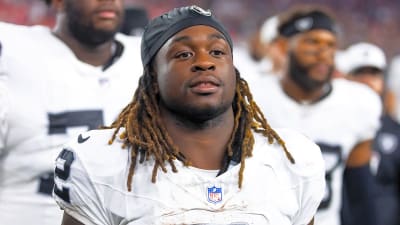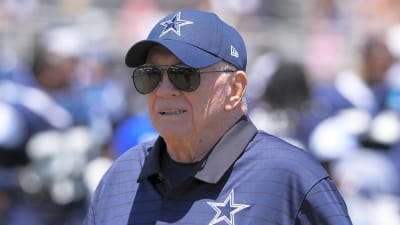
As the 2024-25 Oklahoma City Thunder demonstrated to a tee, recent NBA championship teams have fulfilled three requirements.
The Thunder earned home-court advantage throughout the playoffs with a dominant regular season, winning 68 games through a league-record +1,055 point differential. Oklahoma City then kept its whole rotation on the floor for all four rounds while its opponents suffered untimely injuries.
The final, and most important, step for the Thunder to win back-to-back championships is its playoff performance.
A champion could theoretically lose as many as 12 playoff games if all four rounds go the distance. Oklahoma City experienced an up-and-down postseason, winning the first round and Western Conference Finals in nine combined games but needing home Game 7s to put away the second round's Denver Nuggets and NBA Finals' Indiana Pacers.
However, although the Thunder tied the 2018-19 Toronto Raptors for the second-most playoff losses among the last 10 champions, it tied the 2023-24 Boston Celtics for the third-highest playoff net rating. Oklahoma City outscored the Memphis Grizzlies by 78 total points (+19.5 average differential), the Nuggets by 64 points (+9.1 average differential), the Minnesota Timberwolves by 31 points (+4.4 average differential) and the Pacers by 19 points (+2.7 average differential).
The last decade's title winners averaged 5.1 playoff losses and a +8.1 postseason net rating. Eight champions finished with a better playoff winning percentage than regular-season winning percentage. Five champions accumulated a higher playoff net rating than regular-season net rating.
In other words, title teams have usually played better with increased stakes and against tougher competition.
These teams have also needed superstar-level scorers to drive their offenses when the game offered limited answers. The last 10 champions' leading scorers averaged 28.5 playoff points, with three reaching 30.0 per game. Six of them won regular-season MVPs in previous seasons, and Oklahoma City's Shai Gilgeous-Alexander became the first dual MVP and champion since the 2012-13 Miami Heat's LeBron James.
The Thunder has demonstrated how to win by big margins during the playoffs, especially at home, and it possesses the NBA's most consistent scorer. Continuity and added experience put Oklahoma City in a theoretically better position to repeat this season than it was entering last season.
However, the 13 teams throughout league history that won at least two straight titles averaged slight regular-season and playoff regression.
Here are how those teams' follow-up playoff campaigns compared to their first, adjusting for 16-win paces:
This sample of champions averaged 6.1 playoff losses and a +6.3 playoff net rating, adding 0.8 losses and a -1.5 net rating from their prior years.
The nine back-to-back champions since the NBA instituted a salary cap in 1984-85 have averaged 1.1 more playoff losses and a -2.1 playoff net rating.
Six of 13 repeaters, including five of nine in the salary-cap era, won fewer games in their follow-up playoff runs. The 2009-10 Los Angeles Lakers (16-7) and 2012-13 Heat (16-7) matched their previous years.
Nine of 12 repeaters with data, including eight of nine in the salary-cap era, finished with a lower playoff net rating in their second seasons.
Shaquille O'Neal, Kobe Bryant and the 2000-01 Lakers were an impressive anomaly in this sample, accumulating the best playoff record (on pace for 16-1) and net rating (+13.7). Incredibly, their record-setting postseason came after regressing by 11 wins and a -5.5 net rating during the regular season.
Kevin Durant, Stephen Curry and the 2017-18 Golden State Warriors, the most recent back-to-back champion, regressed by four losses and a -2.6 net rating from their prior playoff run. This dropped them to a mere 16-5 record with a +10.3 net rating.
The 1949-50 Minneapolis Lakers (on pace for three losses) and 1996-97 Chicago Bulls (on pace for four losses) were other standout repeaters.
While ideal, Oklahoma City does not need a dominant postseason to join the back-to-back club, especially if it secures as much home-court advantage as possible.
The 1959-60 Boston Celtics (on pace for 10 losses), 1987-88 Lakers (on pace for 10 losses) and 1968-69 Celtics (on pace for eight losses) each lost at least half their playoff games. Bill Russell headlined two of those squads, and the other employed Magic Johnson, James Worthy and Kareem Abdul-Jabbar.
Last season, the Thunder exceeded the first and second championship requirements and did just enough to meet the third. It is the rightful title favorite because no other team has a better chance to storm through the regular season, utilize depth to mitigate playoff health concerns and perform like champions during the postseason.
More must-reads:
- Jose Mourinho returns to Benfica: A full circle moment for the 'Dark Lord of Football'
- Scout identifies key issue behind Arch Manning's underwhelming start
- The 'Switch-hitter single-season HR leaders' quiz
Breaking News
Trending News
Customize Your Newsletter
 +
+
Get the latest news and rumors, customized to your favorite sports and teams. Emailed daily. Always free!








